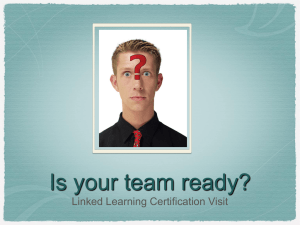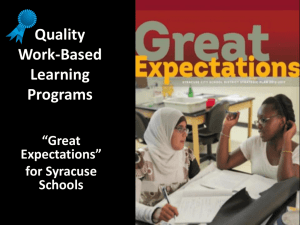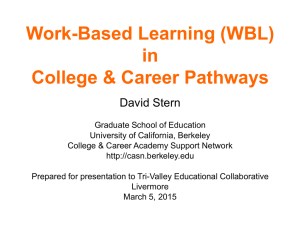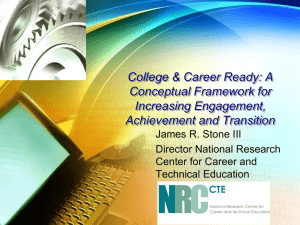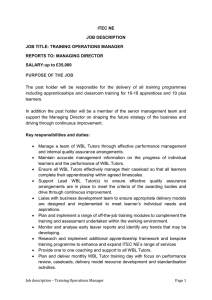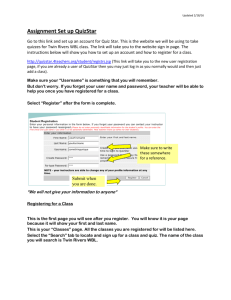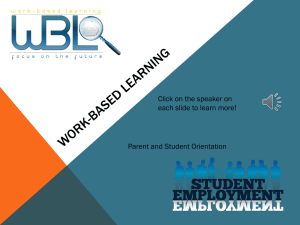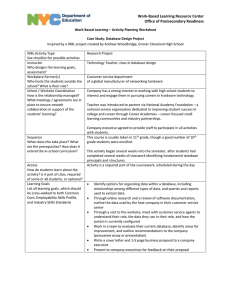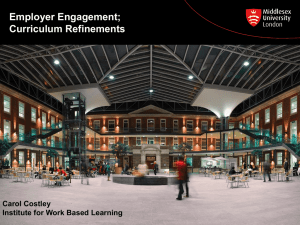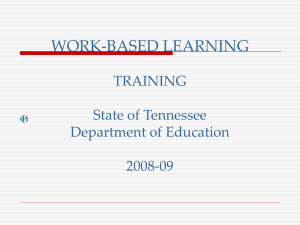Learn and Earn Models: Integrating Schooling and Workplace
advertisement
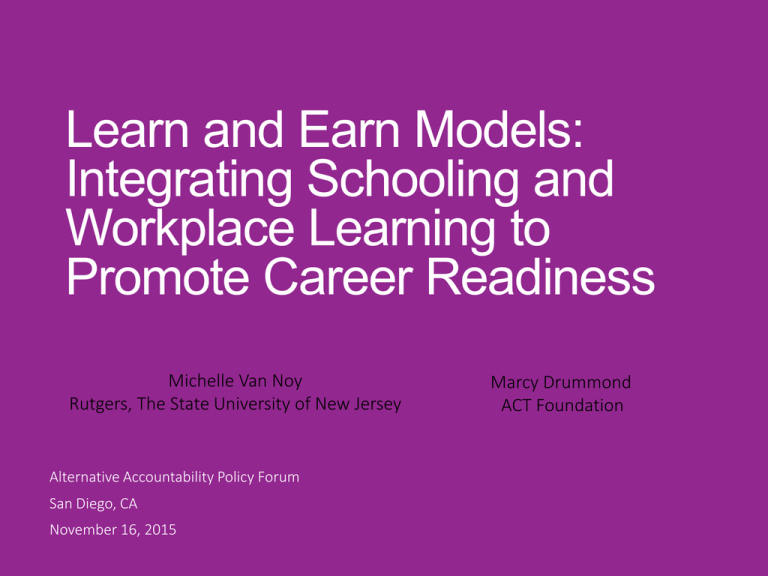
Learn and Earn Models: Integrating Schooling and Workplace Learning to Promote Career Readiness Michelle Van Noy Rutgers, The State University of New Jersey Alternative Accountability Policy Forum San Diego, CA November 16, 2015 Marcy Drummond ACT Foundation What is Learning? Caricature: learning in a classroom in a school leading to a credential Source: http://cstaab.com/wp-content/uploads/flipped-classroom_sage_on_stage_guide_on_side.jpg Need to Re-conceptualize Learning Idea that learning happens all the time everywhere Increasing importance of lifelong learning A wide range of learning occurs outside of formal learning Everyday Workplace Learning Organized Experiential Learning Formal Learning Moving Beyond Formal Learning Formal Informal • Location: school vs. • Process: instructor-led vs. learner-led • Content: organized curriculum vs. contextual • Purpose: intentional vs. incidental school, work, home, community Continuum of Learning Formal learning Organized informal learning Everyday informal learning Self-directed learning Work, community, home Incidental learning Work, community, home Tacit learning/ socialization Work, community, home Location School School, work, or community Process Instructor-led Instructor-led Learner-led Contextual Contextual Content Organized curriculum Organized curriculum Learner organized Spontaneous based on need Social norms and practices Intentionally sought Not intentionally sought, but aware after Not intentionally sought, not aware after Purpose Intentionally sought Intentionally sought How Does Learning Occur Formal Learning Organized Informal Learning Everyday Informal Learning Experiential and relational learning Experiential and relational learning Experiential and relational learning Classroom-based learning Classroom-based learning Experiential Learning: Learning by Doing Learners must be proficient in bridging the gap between theory and practice Effective work-based learning will incorporate multiple modes of learning (such as experiences, social interactions, reflection, etc.) Kolb’s Cycle of Experiential Learning (Kolb, 1984) Relational Learning: Learning from Others Types of Relational Learning: Mentoring, Peer-to-Peer Learning, Coaching, Communities of Practice Benefits: workers gain the knowledge they think is relevant, while organizations benefit from the worker’s greater connection to the profession and often employer Source: http://caeacommcon.ning.com/group/intenti onal-mentoring-advising-and-informal-learni The Role of Technology: Mediating Learning E-Learning online learning, computer-based learning MOOCs Gaming and Simulations Mobile Learning Benefits Challenges • Increased access to content • Learning is not bounded by time or place (Flexibility) • Anonymity frees learner to express lack of knowledge or skills • Allows instruction to be tailored to meet individual goals, needs, interest and prior experience • Requires access to technology • Requires knowledge of how to use the learning platform • Evidence that adults with greater academic skills are more likely to benefit • Attrition An Expanded Conception of Learning Extracurricular activities Service learning Traditional degree programs Community of practice, learning community Modeling others Coop, apprenticeship, internships Non-credit education, continuing education Mentoring, coaching Customized training, workplace training Community education Reading, web searching Socializati on Trial and Error But, A Fragmented Education System… Source: Schurman & Soares, 2010 Discussion In what ways does your organization fit in the current education system? What barriers to recognizing learning do your students encounter in the current education system? Future Forces…Working “GIG” ECONOMY Since the 1980s, the traditional “full-time job with benefits” is becoming less common, replaced by a new gig-togig, project-to-project, contract-to-contract working life. Long-term employment with predictable advancement opportunities is giving way to more short-term, skill- or project-based affiliations. WHO? Freelancers 53 Million Americans 32% of the workforce 50% of the workforce by 2020 WHERE DOES IT OCCUR? Traditional Workplaces Online Workplaces Global TOOLS/ METHODS USED Social Networking Freelancer Co-ops Internet Skill Exchanges Future Forces…Learning INVESTMENTS In Millions GLOBAL PRIVATE INVESTMENTS MADE TO LEARNING TECH COMPANIES $2.600 $2,400 $2,200 2 BILLION DOLLAR THRESHOLD $2,000 $1,800 $1,600 $1,400 $1,200 1 BILLION DOLLAR THRESHOLD $1,000 $800 $600 $400 $200 $0 1999 2000 2001 2002 2003 2004 2005 2006 2007 2008 2009 2010 2011 2012 2013 2014 2015(H1) Future Forces…Learners GENERATION Z LEARNERS Born 1995 to 2010 LEARNING PREFERENCES Wired for fast delivery of content , data, and images from computers Roughly 2 billion youth Want hands-on options and practical skills with employer internships Have preference for digital learning Dislike lecture-based classrooms Want their education customized Expect to work, learn, and study whenever/wherever Love to explore using own route – design own course of study Discussion What do your learners want/need from education…earn and learn programs? In what ways do earn and learn programs need to adapt because of these future forces? Work Based Learning (WBL) Learning on the job that is formally organized and supervised through schools Career Preparation Career Exploration Career Awareness Skill Developme nt Career Exploration Option to be Paid WBL Opportunities Option for Academic Credit Summary of Work-based Learning (WBL) Opportunities Apprenticeship X X X Clinical X Internship X X X X Cooperative Education X X X X School-based Enterprises X X Job Shadowing X Career Academies X Worksite Tours X X WBL & Everyday Workplace Learning The majority of informal learning, includes: Self-directed learning Incidental learning Tacit learning No curriculum Benefits include: Higher employability Better relationships between colleagues and managers Greater human capital Source: http://www.growthengineering.co.uk/sharingknowledge-what-does-your-lms-do-to-promoteinformal-learning/ Benefits of Work Based Learning Development of metacognitive skills Socio-emotional and career development Economic returns in the workforce Stronger partnerships between schools and employers Contribution to the economic well-being of the U.S. WBL: Cooperative Education (Co-ops) Broad term including experiential or work-based learning that integrates school learning and work experience Best Practices: detailing the skills expected to be learned, adhering to training agreements, and implementing a solid coaching system, periodic worksite supervision Benefits: improved career decision making, better problemsolving skills, increased confidence in their ability to work, higher employment rates and salaries WBL: Apprenticeships Formalized paid worker training where a novice employee acquires knowledge through a hierarchical relationship with a master Best Practices: master’s transparency when teaching, sustained organizational commitment, industry-recognized credentialing Benefits: higher wages, higher employment rates, increased confidence and independence WBL: Internships Term-length placement with an organization to gain experience sometimes accompanied by faculty and company supervisors for academic credit Best Practices: crafting academic assignments that ask students to reflect on their work experience, such as daily journaling (Clark, 2003) Benefits: Improvement in communication, writing, problemsolving, and critical thinking, improved ability to place abstract concepts into context, greater self-efficacy and increased ambition Other WBL Opportunities Includes school-based enterprises, job shadowing, and career academies Positively associated with continuing formal schooling Helps students to develop career goals A Closer Look at WBL: Career Academies and Linked Learning Students who had attended career academies were at least as likely to be enrolled in four-year colleges as those students who indicated aspirations to attend college Findings suggest that academies help low-income students finish not only high school, but also college Effective preparation for both college and careers Youth/Young Adult Participation in WBL 7% 26% .28% MIDDLE/HIGH SCHOOL STUDENTS INTERN 9TH TO 12TH GRADERS WORK15 HR/WK US WORKFORCE ARE APPRENTICES Discussion To what extent do you use strategies to link to WBL? How can we greatly increase opportunities for youth/young adults to participate in WBL? The Next Generation of WBL… Discussion To what extent do you use strategies to link to work based learning? In what ways do WBL programs need to the emerging learning economy?
